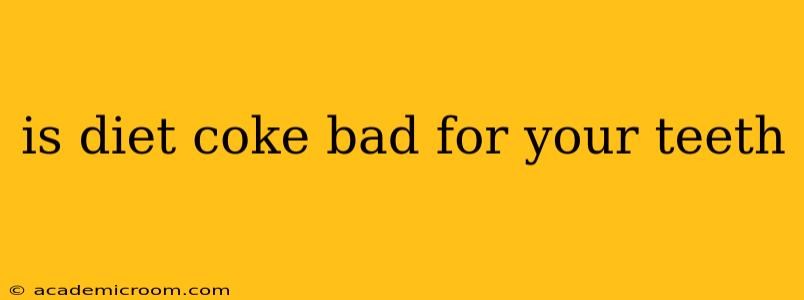Diet Coke, and other diet sodas, have become a popular choice for those looking to reduce sugar intake. However, the question remains: are these sugar-free alternatives actually better for your teeth? The answer, unfortunately, is more nuanced than a simple yes or no. While they lack the sugar that fuels cavity-causing bacteria, diet sodas still pose several risks to dental health.
What Makes Diet Soda Harmful to Teeth?
The primary culprit isn't the absence of sugar, but rather the presence of acidic compounds. Diet sodas are highly acidic, typically boasting a pH level of around 3. This acidic environment erodes tooth enamel, the protective outer layer of your teeth. Repeated exposure to this acidity weakens enamel, making teeth more susceptible to cavities, sensitivity, and even staining.
Does Diet Coke Stain Teeth?
Yes, despite the lack of sugar, diet soda can stain teeth. While the staining isn't as directly linked to sugar as with regular soda, the acidic nature of Diet Coke can wear down enamel, exposing the dentin layer underneath. Dentin is naturally a darker color than enamel, making teeth appear more yellow or stained. Furthermore, some artificial sweeteners and coloring agents in diet soda may also contribute to staining.
Is Diet Coke Worse Than Regular Coke for Teeth?
This is a complex question, and the answer isn't straightforward. Regular Coke contains sugar, which feeds bacteria, leading to acid production and cavities. Diet Coke avoids this direct sugar-related cavity risk, but its high acidity still attacks enamel. Therefore, while regular Coke poses a more direct cavity threat, Diet Coke's consistent acidity can cause significant long-term damage to tooth enamel. Ultimately, both are detrimental to dental health.
What about other diet sodas? Are they all equally bad?
The acidity levels vary slightly between different diet sodas, but they are all generally acidic enough to cause enamel erosion over time. The specific ingredients can also differ, potentially influencing staining or other impacts on oral health.
How can I reduce the damage from Diet Coke?
The best way to minimize damage is moderation or avoidance altogether. If you do consume diet soda, consider these tips:
- Limit consumption: The fewer times you drink diet soda, the less exposure your teeth have to its acidity.
- Rinse your mouth: After drinking diet soda, rinse your mouth with water to help neutralize the acid.
- Wait to brush: The acidity weakens enamel, and brushing immediately afterward can further damage it. Wait at least 30 minutes before brushing.
- Use fluoride toothpaste: Fluoride helps strengthen enamel and make it more resistant to acid attacks.
- Regular dental checkups: Regular visits to your dentist allow for early detection and treatment of any dental problems.
Is there a healthier alternative to Diet Coke?
Water is always the best choice for hydration. Unsweetened tea and coffee (in moderation) are also better options than diet soda.
In conclusion, while Diet Coke may be a sugar-free alternative, it's not a tooth-friendly one. Its high acidity poses a significant threat to enamel health. Moderation, careful oral hygiene, and regular dental checkups are crucial for minimizing the potential damage. Choosing healthier alternatives is always recommended for optimal oral health.
